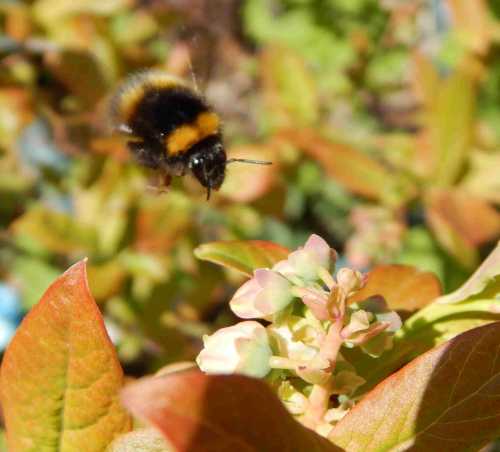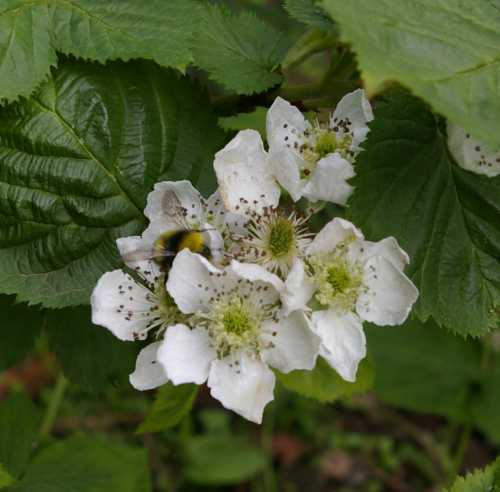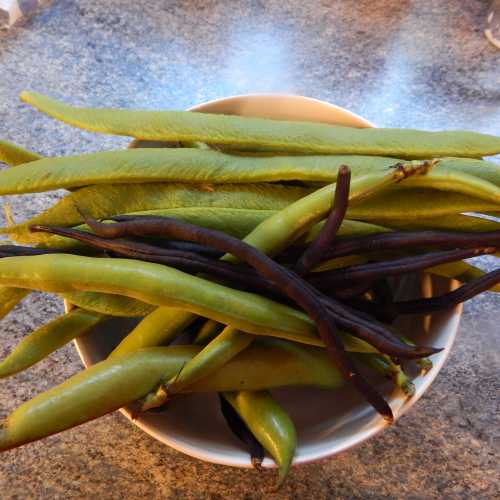Why Do Farmers Need Bees?
Most people are aware that bees are vitally important for pollination, and that there is a connection between bees and many of the tastiest foods that appear on our plates.
However, relatively few people are aware that pollination by bees results in better fruit quality and taste, reduces food wastage and helps improve shelf life!
Below you'll find more detail on why bees are so important to farmers.
12 Reasons Why Bees Are So Important To Farmers
1. Most food crops benefit from pollination by bees
Insect pollination is a key ecosystem service for agriculture, influencing the productivity of 75% of crop species1 and in numerous studies, bees have been found to be the most effective and efficient pollinators.
A mix of wild pollinators and managed pollinators (such as honey bee hives and commercially reared boxes of bumble bees) are used by farmers to pollinate all manner of food crops, such as tomatoes, beans and peas, blueberries, apples, almonds and seeds.
2. Some crops cannot produce fruits without bees
Some plants absolutely rely on bees, and without them, the plants will produce very few, or even no fruits at all.
There are a number of examples where this is the case, including watermelon plants which absolutely require pollination from both honey bees and wild bees in order for the plant to produce healthy fruits. Each flower produced by the watermelon plant only lasts a day, and ideally requires multiple visits by bees.
Lack of pollination by bees can result in significantly fewer fruits and misshapen fruits that are less sweet.
3. Pollination by bees improves abundance (yield) of fruits, pulses, seeds, berries and nuts.
This has been proven in numerous studies including apples, blueberries2, strawberries3 to name a few.

4. Pollination by bees results in higher profit for farmers
In other words, bees help farmers earn a living! Given that pollination by bees results in better quality produce, this means the farmer can get a higher price for his crops, so from the perspective of the farmer, bees are a valuable partner.
The farmer will plant the crop and devote the time and effort necessary to get the best quality produce, but its the input of the bees that will make the difference to how profitable his business is.
It means that every hectare of land will produce a higher amount of profit if bees are visiting the crops grown on it.
Numerous studies confirm that bee pollination enables farmers to gain a higher price for their produce, including in apples4, strawberries3, blueberries2 and watermelons.

5. Pollination by bees can help increase shelf-life of fruits and reduce food waste!
Some food crops have a short shelf-life, leading to food wastage. For example, more than 90% of strawberry fruits can become non-marketable after only 4 days in storage5.
Yet studies of pollination in strawberries by Klatt et al (2014)3 found that thanks to bees, strawberries last longer, than they otherwise would, resulting in less wastage.
The longer shelf life meant that fewer fruits had to be thrown away, saving farmers lots of money. In particular, the research states that pollination of strawberries by bees...
".....increased redness and reduced sugar–acid–ratios and were firmer, thus improving the commercially important shelf life.
Longer shelf life reduced fruit loss by at least 11%. This is accounting for 0.32 billion US$ of the 1.44 billion US$ provided by bee pollination to the total value of 2.90 billion US$ made with strawberry selling in the European Union 2009."
Klatt et al make the point that pollination by bees affects hormonal growth regulators affecting fruit quality and yield, and that these hormonal growth regulators occur in other food crops. They conclude:
"Thus, our comprehensive findings should be transferable to a wide range of crops and demonstrate bee pollination to be a hitherto underestimated but vital and economically important determinant of fruit quality."
6. Bees provide pollination services even in cooler weather
A notable example is that honey bees are vital for almond pollination. This is because honey bees are able to venture out in cooler weather when other insects are still hibernating, and the almond tree is in blossom.
7. Pollination by bees results in tastier fruits
By measuring the natural fruit sugar content of fruits pollinated by bees, and identical fruits not pollinated by bees, its possible to scientifically prove that pollination by bees results in sweeter fruits. For example:
- this has been proven to be the case with apples6
- in melon7
- loquat fruit (Japanese plum)8
8. The high nutritional value of bee-pollinated crops helps drive demand
It is mostly pollination-dependent crops such as fruits that contribute to a healthy human diet by providing particularly high amounts of essential nutrients such as vitamins, antioxidants and fibre9,10.
Berries especially have been found to benefit human health and are increasingly used for therapies against chronic diseases and even cancer9.
We could speculate that pursuit of better health will help drive future demand for these crops, and farmers will in turn be keen to grow them. Bees will be vital for farmers for pollination of these crops.
9. Pollination by bees results in a better shaped fruit
In a number of studies, it has shown that pollination by bees results in fewer misshapen or deformed crops, for example in
- watermelons
- beans11
- strawberries3

10. Pollination by bees can hasten ripening
This is especially important for farmers growing early fruits, and has found to be the case with, for example, some species of blueberry2 .
11. Bees pollinate food crops for animals
It's important to remember that some farmers keep livestock, and livestock also need to be fed! Bees are an important pollinator of a number of food stuffs for animals, such as alfalfa for cattle.
12. Bees offer value for money to farmers!
Wild bees pollinate crops for free, the services of managed bees to pollinate crops can be purchased for a very low price. If it were not for bees, farmers would have to turn to hand pollination (as is happening in parts of China). This would make the growing of important food crops prohibitively expensive.
References
1. Klein A-M, Vaissière BE, Cane JH, Steffan-Dewenter I, Cunningham SA, Kremen C, et al. (2007) Importance of pollinators in changing landscapes for world crops. Proceedings of the Royal Society B: Biological Sciences 274: 303–313. pmid:17164193.
2. Lang, Gregory & Danka, Robert. (1991). Honey-bee-mediated Cross- versus Self-pollination of `Sharpblue' Blueberry Increases Fruit Size and Hastens Ripening. Journal of the American Society for Horticultural Science. American Society for Horticultural Science. 116. 10.21273/JASHS.116.5.770.
3. Klatt BK, Holzschuh A, Westphal C, Clough Y, Smit I, Pawelzik E, et al. (2014) Bee pollination improves crop quality, shelf life and commercial value. Proceedings of the Royal Society of London B: Biological Sciences 281.
4.Garratt MP, Breeze TD, Jenner N, Polce C, Biesmeijer JC, Potts SG. Avoiding a bad apple: Insect pollination enhances fruit quality and economic value. Agric Ecosyst Environ. 2014 Feb 1;184(100):34-40. doi: 10.1016/j.agee.2013.10.032. PMID: 24748698; PMCID: PMC3990452.
5. Hernandez-Munoz P, Almenar E, Ocio MJ& Gavara R. 2006Effect of calcium dips and chitosan coatings on postharvest life of strawberries (Fragaria x ananassa). Postharvest Biol. Technol. 39, 247–253. (doi:10.1016/j.postharvbio.2005.11.006).
6. M. P. D. Garratt, C. L. Truslove, D. J. Coston, R. L. Evans, E. D. Moss, C. Dodson, N. Jenner, J. C. Biesmeijer and S. G. Potts. POLLINATION DEFICITS IN UK APPLE ORCHARDS. Journal of Pollination Ecology, Vol 12, 2014.
7. Shin YS, Park SD& Kim JH. 2007Influence of pollination methods on fruit development and sugar contents of oriental melon (Cucumis melo L. cv. Sagyejeol-Ggul). Sci. Horticult. 112, 88–392. (doi:10.1016/j.scienta.2007.01.025). Crossref, Google Scholar
8. Freihat NM, Al-Ghzawi AA-M, Zaitoun S& Alqudah A. 2008Fruit set and quality of loquats (Eriobotrya japonica) as effected by pollinations under sub-humid Mediterranean. Sci. Horticult. 117, 58–62. (doi:10.1016/j.scienta.2008.03.012). Crossref, Google Scholar
9. Seeram NP. 2008Berry fruits: compositional elements, biochemical activities, and the impact of their intake on human health, performance, and disease. J. Agric. Food Chem. 56, 627–629. (doi:10.1021/jf071988k). Crossref, PubMed, Google Scholar
10. Eilers EJ, Kremen C, Greenleaf SS, Garber AK& Klein A-M. 2011Contribution of pollinator-mediated crops to nutrients in the human food supply. PLoS ONE 6, e21363. (doi:10.1371/journal.pone.0021363). Crossref, PubMed, ISI, Google Scholar
11.https://www.sciencemag.org/news/2013/12/better-berry-thanks-bees